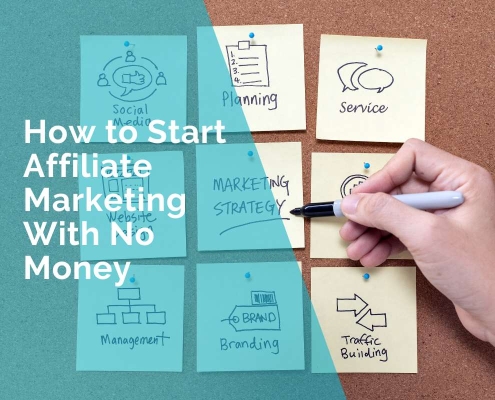Real Estate Marketing Ideas and Trends for 2024
The only thing that is constant in the quick-paced world of real estate marketing is change. As 2024 approaches, it’s becoming more and more clear that innovation and adaptation are necessary for survival and success in this fast-paced sector, not just beneficial.
The combination of changing consumer habits, technology breakthroughs, and shifting market conditions means that real estate agents need to be proactive in recognizing and seizing new trends to stay ahead of the competition.
We take a deep dive into the most promising tactics and cutting-edge trends that could significantly impact the real estate marketing landscape in the upcoming year and beyond as we explore the complex field of real estate marketing, so check them out right now.
Artificial Intelligence (AI) in Marketing Automation
Artificial intelligence (AI) is a revolutionary force that’s changing how businesses across the world work, and the same goes for real estate professionals who need to interact with their audience and maximize the power of automation and data analytics. AI-driven marketing automation solutions, which are driven by sophisticated machine learning algorithms, enable marketers to sort through enormous amounts of data, spot trends, and forecast customer behavior with unmatched precision.
With AI, marketers can create customized experiences at scale, resulting in more meaningful engagement and deeper audience connections through personalized email campaigns and dynamic website content. The rise of AI in real estate marketing is showing no signs of slowing down as we navigate the challenging landscape of 2024. It is poised to bring about a new era of lead generation and customer engagement that has never been seen before.
Virtual Reality and Augmented Reality (VR/AR) Integration
Few technological advancements are as promising and potentially transformative to the real estate marketing industry as the smooth fusion of augmented reality (AR) and virtual reality (VR). With these immersive technologies, prospective buyers can now access properties like never before, regardless of their location, and real estate professionals can’t live without them.
Potential buyers can examine properties with a level of detail and realism that was previously unthinkable thanks to immersive virtual tours and interactive visualizations, which help them make better decisions without ever having to visit the property. With technology advancing and consumer expectations rising, the trajectory of VR and AR integration in real estate marketing is set to soar as we forge ahead into uncharted territory in 2024.
Hyper-Targeted Digital Advertising
Real estate marketers now need to be able to cut through the clutter and provide focused, pertinent messaging because we live in a time of fragmented attention spans and information overload. Here comes hyper-targeted digital advertising, a tactic that makes use of the vast amount of data made available by digital platforms to identify and interact with particular psychographic and demographic groups.
Marketers can precisely tailor their campaigns to resonate with the right audience at the right time by utilizing sophisticated targeting algorithms and granular audience segmentation techniques. The constant search for hyper-targeted precision in real estate marketing is anticipated to pick up steam in 2024 and beyond, pushing marketers to adapt to new technologies and continuously hone their approaches.
Content Marketing and Storytelling
For real estate agents, capturing and retaining the interest of potential buyers has become more difficult in a time of information overload and short attention spans. Let us introduce you to content marketing and storytelling, two tactics that have become extremely effective in creating a sense of brand awareness, credibility, and emotional bonds with viewers.
Marketers can create meaningful engagement that goes beyond the transactional nature of real estate transactions by creating compelling narratives that connect with their target demographic.
As we approach 2024 and beyond, storytelling will continue to be a key component of successful real estate marketing strategies, whether it takes the form of blog posts that highlight a property’s distinctive features or immersive virtual tours that take viewers to their ideal homes.
This can help people across the globe find amazing places to live, including appealing luxury apartments in Baltimore, for instance, where they can find comfort and enjoy all the amenities and features highlighted in their descriptions.
Sustainable and Eco-Friendly Developments
There has been a discernible shift in customer preferences toward homes that emphasize eco-friendly features and green living as worries about climate change and environmental sustainability continue to grow. To appeal to buyers who are concerned about the environment, real estate developers and marketers have taken notice of this trend and are incorporating eco-friendly amenities and sustainable design principles into their offerings.
In the cutthroat real estate market, the focus on sustainability has emerged as a critical differentiator, from energy-efficient appliances to LEED-certified buildings. Anticipating even greater attention to be paid to sustainable developments in 2024, as consumers prioritize environmental factors more and more when making decisions about what to buy.
Influencer Marketing in Real Estate
Influencer marketing has become a potent tool for reaching and interacting with target audiences in a variety of industries, including real estate, at a time when social media and digital influencers are dominating the landscape. Real estate professionals can expand their reach and improve the visibility of their brands by collaborating with influencers who have a devoted following and established credibility in their industry.
Collaborating with influencers provides a unique opportunity to connect with potential buyers in genuine and meaningful ways. These influencers can be anyone from Instagram influencers sharing gorgeous property photos to YouTube personalities offering insights into the housing market. Influencer partnerships should continue to gain traction as a strategic element of marketing strategies in 2024 as we navigate the changing real estate marketing landscape.
Virtual Events and Webinars
The COVID-19 pandemic has drastically changed how real estate agents interact with their clients and present properties, hastening the transition from in-person events and webinars to virtual ones as the main avenues for marketing. Virtual gatherings have become a safe and practical substitute for conventional in-person events in the wake of widespread lockdowns and social distancing measures.
They provide real estate professionals with a platform to showcase properties, share market insights, and interact with potential buyers from the comfort of their own homes.
Virtual events, which range from educational webinars on investment strategies and market trends to virtually hosted open houses, have become a vital resource for real estate marketers trying to adjust to the new normal. In 2024, virtual events and webinars should continue to be a major part of real estate marketing plans, as agents look to use technology to connect with customers and spur business expansion in a world going more digital.
Personalized Customer Experiences
To stay competitive in today’s market, real estate professionals need to give customization and personalization top priority in their marketing campaigns, as consumers have come to expect tailored experiences from every touchpoint. Marketers can customize their communications and offerings by utilizing customer relationship management (CRM) systems and data analytics to obtain valuable insights into their target audience’s preferences, behaviours, and purchasing patterns.
Personalization has become a key component of successful real estate marketing strategies, whether it is through the delivery of tailored content that speaks to a buyer’s needs and concerns or the recommendation of properties based on their past searches. In 2024, individualized customer experiences should continue to be prioritized as real estate agents look to stand out in a crowded market and develop enduring relationships with their clients.
Blockchain Technology in Real Estate Transactions
The advent of blockchain technology presents a promising opportunity to transform the real estate industry by providing a safe, transparent, and effective substitute for conventional approaches. Blockchain solutions lower the risk of fraud and expedite the conveyancing process by utilizing distributed ledger technology to record and verify property transactions in an immutable and tamper-proof manner.
Video Marketing Dominance
Video marketing has become a dominant force in the real estate industry, providing marketers with a potent tool for grabbing the interest and imagination of potential buyers in an era where visual content is king. Video content enables real estate agents to present properties in a dynamic and captivating way that appeals to today’s buyers, from immersive property tours to dramatic neighbourhood showcases.
Marketers can generate strong emotions, establish credibility, and increase conversions through the emotive power of video storytelling in ways that are unmatched by text and static images alone. In 2024, we’ll see a lot of changes in the real estate industry, but one thing to anticipate is that video marketing will still be a major source of engagement and conversion as agents look to use the compelling nature of visual storytelling to engage clients more deeply.
Real estate marketing is at a turning point, full of opportunities and rich with potential, as we set out on the journey that is 2024. Real estate professionals need to embrace change, adjust to new realities, and chart a path toward a future characterized by innovation, resilience, and growth in the face of unrelenting technological innovation, shifting consumer preferences, and changing market dynamics.
The way forward is illuminated by a constellation of emerging trends and strategies, whether it’s utilizing the transformative potential of blockchain technology, the immersive power of virtual reality, or the precision targeting capabilities of hyper-targeted digital advertising. In the years to come, as we negotiate the challenging landscape of real estate marketing, let’s take advantage of the numerous opportunities that lie ahead and move forward with bravery, ingenuity, and conviction to jointly shape the industry’s future.













